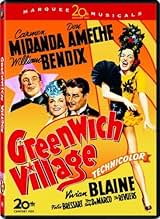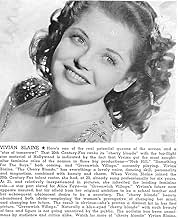In 1922, a would-be classical composer gets involved with people putting on a musical revue.In 1922, a would-be classical composer gets involved with people putting on a musical revue.In 1922, a would-be classical composer gets involved with people putting on a musical revue.
Paul Hurst
- Milkman
- (scenes deleted)
Bill Alcorn
- Costume Party Guest
- (uncredited)
Maceo Anderson
- One of the Four Step Brothers
- (uncredited)
Charles Arnt
- Author with Letter
- (uncredited)
Buddy Banks
- Clarinet Player
- (uncredited)
Oliver Blake
- Bigelow - Author
- (uncredited)
Herman Boden
- Chorus Boy
- (uncredited)
Featured reviews
The film, not surprisingly, is set in Greenwich Village, New York (actually a sound stage at Twentieth Century-Fox) and begins with an eager young composer, Kenneth (Don Ameche), arriving in town--hoping to make it big. Soon, he meets up with Dan (William Bendix) and his friends at Danny's Den--the strangest speakeasy in Hollywood history. At this 'joint', Carmen Miranda and Vivian Blaine perform. After hearing some of Kenneth's music, Danny decides to put on a show to showcase his sweetie. The problem is that this sweetie (Blaine) might just be in love with Kenneth AND some sharpie (Felix Bressart) is interested in having the music performed instead by a big-name director instead of on some stage show in the Village. What's next? See the film....or not.
I am glad I watched this film when I did, as I had just finished watching a GREAT MGM musical, "Anchors Away". Although both films were in color, there weren't too many other similarities. "Anchors Away" had great music, singing, plot--everything. And, by comparison, "Greenwich Village" just looked tired and second-rate...which, is what it was. As for Carmen Miranda, she seemed unnecessary to the film and a bit lost. Additionally, fair tunes and the studio's lesser singers (Alice Faye was out on maternity leave), the film never really hit the mark and is a few steps below the average Fox musical of the period. And, when it was over, I couldn't remember much of anything about it. Adequate and no more.
By the way, I was VERY surprised to see Ernest 'Sunshine Sammy' Morrison in the film dancing and singing a musical number with a number of other black entertainers. While I was VERY familiar with him as a member of Our Gang (since its beginning) and the East Side Kids, I had no idea he was so talented in other ways.
I am glad I watched this film when I did, as I had just finished watching a GREAT MGM musical, "Anchors Away". Although both films were in color, there weren't too many other similarities. "Anchors Away" had great music, singing, plot--everything. And, by comparison, "Greenwich Village" just looked tired and second-rate...which, is what it was. As for Carmen Miranda, she seemed unnecessary to the film and a bit lost. Additionally, fair tunes and the studio's lesser singers (Alice Faye was out on maternity leave), the film never really hit the mark and is a few steps below the average Fox musical of the period. And, when it was over, I couldn't remember much of anything about it. Adequate and no more.
By the way, I was VERY surprised to see Ernest 'Sunshine Sammy' Morrison in the film dancing and singing a musical number with a number of other black entertainers. While I was VERY familiar with him as a member of Our Gang (since its beginning) and the East Side Kids, I had no idea he was so talented in other ways.
If you are looking for some light entertainment with a few pleasant musical numbers, this is the film for you. The story is silly, but Don Ameche is good in his role as the would-be composer. Unfortunately, the ending is abrupt and unbelievable.
Anyone looking for the Greenwich Village of bygone days will be sadly disillusioned by this film. The area known for all time for its Bohemian atmosphere and now for its outrageously overpriced just about everything will not be found here. Club owner William Bendix isn't even fond of bootleg whiskey in his joint as he's continually throwing out bootlegger Tom Dugan from his place. Of all the places in New York State during the Twenties where Governor Alfred E. Smith stated publicly he would not enforce prohibition, Greenwich Village was the area that flouted the Volstead Act the most with impunity and flare.
The score for Greenwich Village is made up mostly of old standards and the film was an opportunity for Darryl Zanuck to launch a new musical star in the tradition of Alice Faye and Betty Grable. Vivian Blaine was 'introduced' in Greenwich Village and in film she never quite got the success the other two ladies did. She did best on Broadway, most unforgettably as Adelaide in Guys And Dolls. The new songs were nothing to remember.
Young Don Ameche arrives in Manhattan from Wichita, Kansas where he was a professor of music there and he's written a concerto. No big market for concertos, but there's a passage in the concerto that sounds promising to William Bendix. It turns out to be the big hit song from the beginning of the Roaring Twenties, Whispering. Bendix has big ideas wanting to put on a big revue and if he can't get Ameche's bankroll which he's carrying, he'd sure like a loan on his talent.
It's all an excuse to put on a lot of numbers, but Greenwich Village seems to lack the creative flair of 20th Century Fox's earlier films with Betty Grable and Alice Faye. William Bendix, borrowed from Paramount where he mostly played good natured mugs, just does not strike one as a would be Ziegfeld. Carmen Miranda is just Carmen Miranda and she's the best thing about Greenwich Village.
Just not the best musical Fox ever put out.
The score for Greenwich Village is made up mostly of old standards and the film was an opportunity for Darryl Zanuck to launch a new musical star in the tradition of Alice Faye and Betty Grable. Vivian Blaine was 'introduced' in Greenwich Village and in film she never quite got the success the other two ladies did. She did best on Broadway, most unforgettably as Adelaide in Guys And Dolls. The new songs were nothing to remember.
Young Don Ameche arrives in Manhattan from Wichita, Kansas where he was a professor of music there and he's written a concerto. No big market for concertos, but there's a passage in the concerto that sounds promising to William Bendix. It turns out to be the big hit song from the beginning of the Roaring Twenties, Whispering. Bendix has big ideas wanting to put on a big revue and if he can't get Ameche's bankroll which he's carrying, he'd sure like a loan on his talent.
It's all an excuse to put on a lot of numbers, but Greenwich Village seems to lack the creative flair of 20th Century Fox's earlier films with Betty Grable and Alice Faye. William Bendix, borrowed from Paramount where he mostly played good natured mugs, just does not strike one as a would be Ziegfeld. Carmen Miranda is just Carmen Miranda and she's the best thing about Greenwich Village.
Just not the best musical Fox ever put out.
Let me add my voice to those who say we should not judge this piece of Zanuckfluff with the same standard we'd use for The Bard of Avon or even a Gene Kelly movie. Yes, the story is preposterous, pasted together with no other reason than to showcase the talents of some remarkably talented people, all having a great deal of fun, which I suspect anyone with the slightest nostalgia for the Technicolor movies of the war years will share. William Bendix, an actor vastly underrated, is both funny and touching, and Vivian Blaine and her one day to be fellow cast member from "Guys and Dolls," B.S. Pully, are wonderful. Felix Breshart, wearing the same scarf he wore in "To Be or Not to Be," is lovable as always as the musical con man. This is Greenwich Village as it never was and will never be. Sit back, suspend disbelief, and enjoy yourself. They don't make 'em like this anymore, and I for one regret it.
Here is a confection designed to be a showcase for the adorable Carmen Miranda. It is her first starring role and she is given a lavish showcase in which to weave her magic. Vivian Blane, a gorgeous redhead, is given ample opportunity to show off her singing talents. In all, this is a typical example of the Fox musical of the forties. As far as the color goes, no one did it better than Fox. The vivid Technicolor fairly jumps off the screen, and the print on my DVD is extremely well preserved. WW2 saw a whole series of vividly Technicolored Fox films which were designed to take one's mind off the troubles at hand. As escapism, they were light, fluffy confections with good cheer and lovely visuals taking the place of great dramatic weight. Fox Technicolor at this time could be called super-saturated. Very bright and with set and costume design done to take full advantage of the pallete. Most of these Fox musicals have been amazingly preserved, given their age, and all have a nostalgic entertainment value. They really don't make 'em like this anymore.
Did you know
- TriviaThe Revuers (Betty Comden, Adolph Green, Judy Holliday and Alvin Hammer) received billing (as a group), but their one musical number, "The Baroness Bazooka," was cut from the release print. Their remaining roles are little better than extras.
- GoofsThe opening narration on the bus claims that George Gershwin was one of those legendary talents who got his start in Greenwich Village, but in 1922, when this film supposedly takes place, Gershwin was just starting out.
- Quotes
Princess Querida O'Toole: Would you like to take advantage of me?
- ConnectionsEdited into Carmen Miranda (1969)
- SoundtracksI'm Just Wild About Harry
(uncredited)
Music by Eubie Blake
Lyrics by Noble Sissle
Performed by Carmen Miranda
Details
- Runtime
- 1h 22m(82 min)
- Aspect ratio
- 1.37 : 1
Contribute to this page
Suggest an edit or add missing content



































